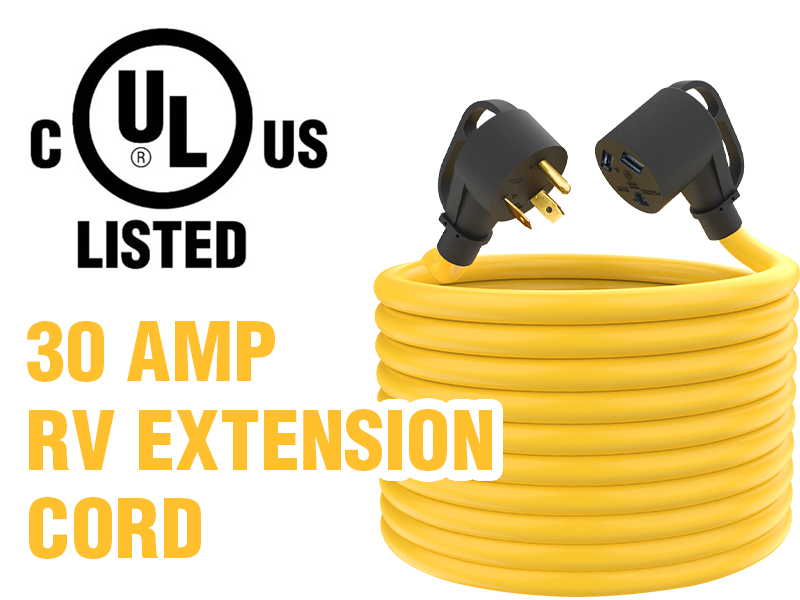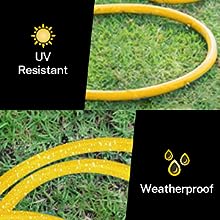HOW TOS & TIPS
Top Strategies for Extending Power Outdoors
Writer: admin Time:2023-11-05 18:31:31 Browse:54℃

Need electricity outside your home? Whether it's a short-term need or a longer-term requirement, the experts at Hubrv have you covered. Discover safe ways to extend power outdoors with these outdoor electrical guidelines.
Short-Term Power Provision Utilize extension cords: If you only require outdoor power for a brief period, like running equipment or providing temporary lighting, an extension cord is the perfect solution. It can fulfill your power needs for a day or two. Ensure you use extension cords specifically designed for outdoor use, as they can withstand moisture, temperature fluctuations, sunlight, and light foot traffic. Never use indoor extension cords outdoors, as they can easily break, posing fire and shock hazards.
Safety Tips for Outdoor Extension Cords:
Select the right cord that can handle the combined wattage of connected devices. Typically, thicker wires can handle more current, but always check the manufacturer's label.
Plug your outdoor extension cords into a GFCI outlet, recognizable by the TEST/RESET buttons found in areas like kitchens, bathrooms, and garages. These outlets protect against electrical shock if exposed to water.
Ensure the cord is an appropriate length to prevent tripping hazards.
Store the cord indoors when not in use.
Long-Term Power Supply For sustained outdoor power, a GFCI-equipped outlet is essential for safety in moisture-exposed areas. When considering an outdoor outlet, select a weatherproof, outdoor-rated model with built-in, high-sensitivity GFCI protection.
Can Extension Cords Get Wet?
Many of us have experienced it - we're in the midst of weekend yard work, and then suddenly, an unexpected rain shower interrupts our landscaping efforts. If you're using electrical yard tools, you might be concerned and questioning whether extension cords can be exposed to moisture.
Types of Electrical Extension Cords
When you were in the market for an extension cord, you probably faced a multitude of choices, each differing in color and thickness. The answer to your question lies in the type you purchased.
Indoor Extension Cords:These cords are designed for light-duty, dry, indoor use only.
Outdoor Extension Cords:These models come heavily insulated to resist water, oil, and heat, specifically crafted for outdoor use with lawn equipment and power tools.

What to Do If Your Indoor Extension Cord Gets Wet:Extension cords are typically insulated, with no internal electrical components susceptible to water damage. However, if water infiltrates the metal prongs or enters the plug outlet, it may lead to short circuits, fires, or pose electrocution risks for anyone in contact with it.
Never use an indoor extension cord outdoors. If water accidentally splashes onto an indoor extension cord while it's in use, and the plug end or outlet gets wet, the main breaker should be turned off to prevent potential electrocution.
Ensure your hands are completely dry, then cautiously turn off any devices connected to the extension cord. Use only the insulated plastic or rubber sections to unplug it from the wall outlet.
Afterward, you can restore power to the breaker if it is turned off. Allow the extension cord to thoroughly air dry in an uncoiled position for several days. If the extension cord wasn't in use, initiate the drying process by allowing it to air out for several days.
Outdoor Extension Cords: Outdoor extension cords often come into contact with rain and snow. While this is not ideal, it generally poses no danger or harm.

While water won't harm the cord, avoid touching the wet plug when disconnecting it.
If you've left an outdoor extension cord exposed to the elements, allow it to dry in place before unplugging and storing it. Although it remains safe while it dries, prolonged exposure to the elements can degrade the heavy insulation that renders it suitable for outdoor use.
Prioritize Safety:If your home is filled with extension cords and power strips, it might be time to consider rewiring your home to accommodate your connected lifestyle. Overloaded outlets pose a serious fire risk, and upgrading your electrical panel and adding more outlets could be the solution to keep your home powered and secure.
CATEGORIES
LATEST NEWS
- RV Distribution Adapter: Your Power Multiplier on the Go
- Discovering Winter Wonders: Top RV Getaways in North America
- Embracing the Chill: An In-Depth Guide to Winter RV Adventures in the U.S
- Winter RV Journey: A Detailed 7-Day Adventure Through Colorado's Rocky Mountains
- Autumn RV Adventure in Yellowstone National Park: A 10-Day Journey
CONTACT US
QQ:
Phone: rrvrrv.com
Tel: rrvrrv.com
Email:
Add: 19465 E Walnut Dr N CITY OF INDUSTRY CA US